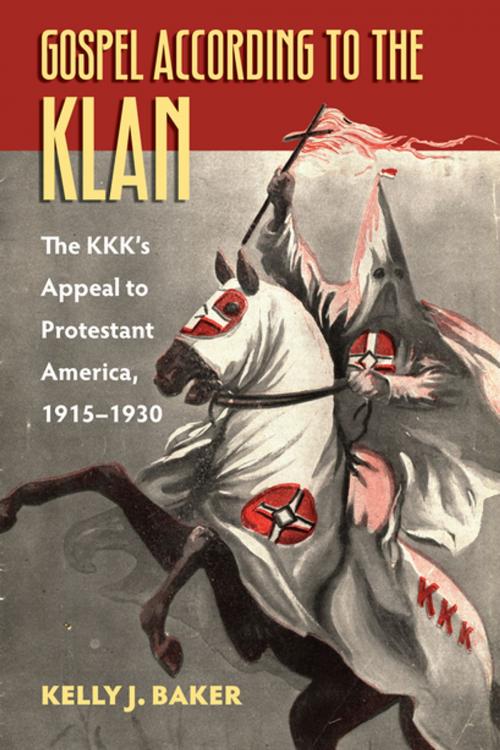Gospel According to the Klan
The KKK's Appeal to Protestant America, 1915-1930
Nonfiction, History, Americas, United States, 20th Century, Religion & Spirituality, Christianity| Author: | Kelly J. Baker | ISBN: | 9780700624560 |
| Publisher: | University Press of Kansas | Publication: | March 20, 2017 |
| Imprint: | University Press of Kansas | Language: | English |
| Author: | Kelly J. Baker |
| ISBN: | 9780700624560 |
| Publisher: | University Press of Kansas |
| Publication: | March 20, 2017 |
| Imprint: | University Press of Kansas |
| Language: | English |
To many Americans, modern marches by the Ku Klux Klan may seem like a throwback to the past or posturing by bigoted hatemongers. To Kelly Baker, they are a reminder of how deeply the Klan is rooted in American mainstream Protestant culture.
Most studies of the KKK dismiss it as an organization of racists attempting to intimidate minorities and argue that the Klan used religion only as a rhetorical device. Baker contends instead that the KKK based its justifications for hatred on a particular brand of Protestantism that resonated with mainstream Americans, one that employed burning crosses and robes to explicitly exclude Jews and Catholics.
To show how the Klan used religion to further its agenda of hate while appealing to everyday Americans, Kelly Baker takes readers back to its "second incarnation" in the 1920s. During that decade, the revived Klan hired a public relations firm that suggested it could reach a wider audience by presenting itself as a "fraternal Protestant organization that championed white supremacy as opposed to marauders of the night." That campaign was so successful that the Klan established chapters in all forty-eight states.
Baker has scoured official newspapers and magazines issued by the Klan during that era to reveal the inner workings of the order and show how its leadership manipulated religion, nationalism, gender, and race. Through these publications we see a Klan trying to adapt its hate-based positions with the changing times in order to expand its base by reaching beyond a narrowly defined white male Protestant America.
This engrossing expos looks closely at the Klan's definition of Protestantism, its belief in a strong relationship between church and state, its notions of masculinity and femininity, and its views on Jews and African Americans. The book also examines in detail the Klan's infamous 1924 anti-Catholic riot at Notre Dame University and draws alarming parallels between the Klan's message of the 1920s and current posturing by some Tea Party members and their sympathizers.
Analyzing the complex religious arguments the Klan crafted to gain acceptability—and credibility—among angry Americans, Baker reveals that the Klan was more successful at crafting this message than has been credited by historians. To tell American history from this startling perspective demonstrates that some citizens still participate in intolerant behavior to protect a fabled white Protestant nation.
To many Americans, modern marches by the Ku Klux Klan may seem like a throwback to the past or posturing by bigoted hatemongers. To Kelly Baker, they are a reminder of how deeply the Klan is rooted in American mainstream Protestant culture.
Most studies of the KKK dismiss it as an organization of racists attempting to intimidate minorities and argue that the Klan used religion only as a rhetorical device. Baker contends instead that the KKK based its justifications for hatred on a particular brand of Protestantism that resonated with mainstream Americans, one that employed burning crosses and robes to explicitly exclude Jews and Catholics.
To show how the Klan used religion to further its agenda of hate while appealing to everyday Americans, Kelly Baker takes readers back to its "second incarnation" in the 1920s. During that decade, the revived Klan hired a public relations firm that suggested it could reach a wider audience by presenting itself as a "fraternal Protestant organization that championed white supremacy as opposed to marauders of the night." That campaign was so successful that the Klan established chapters in all forty-eight states.
Baker has scoured official newspapers and magazines issued by the Klan during that era to reveal the inner workings of the order and show how its leadership manipulated religion, nationalism, gender, and race. Through these publications we see a Klan trying to adapt its hate-based positions with the changing times in order to expand its base by reaching beyond a narrowly defined white male Protestant America.
This engrossing expos looks closely at the Klan's definition of Protestantism, its belief in a strong relationship between church and state, its notions of masculinity and femininity, and its views on Jews and African Americans. The book also examines in detail the Klan's infamous 1924 anti-Catholic riot at Notre Dame University and draws alarming parallels between the Klan's message of the 1920s and current posturing by some Tea Party members and their sympathizers.
Analyzing the complex religious arguments the Klan crafted to gain acceptability—and credibility—among angry Americans, Baker reveals that the Klan was more successful at crafting this message than has been credited by historians. To tell American history from this startling perspective demonstrates that some citizens still participate in intolerant behavior to protect a fabled white Protestant nation.















